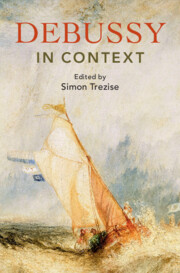Book contents
- Debussy in Context
- Composers in Context
- Debussy in Context
- Copyright page
- Dedication
- Contents
- Illustrations
- Contributors
- Preface
- Notes on the Text
- Abbreviations
- Part I Paris: City, Politics, and Society
- Part II The Arts
- Chapter 6 Debussy’s Impressionism Interrogated
- Chapter 7 Symbolism
- Chapter 8 Modernism
- Chapter 9 Wagnérisme
- Chapter 10 Japonisme, Collecting, and the Expositions Universelles
- Chapter 11 Cross-Currents in Debussy’s Creative World
- Part III People and Milieu
- Part IV Musical Life: Infrastructure and Earning a Living
- Part V The Music of Debussy’s Time
- Part VI Performers, Reception, and Posterity
- Recommendations for Further Reading and Research
- Index
Chapter 9 - Wagnérisme
from Part II - The Arts
Published online by Cambridge University Press: 23 May 2024
- Debussy in Context
- Composers in Context
- Debussy in Context
- Copyright page
- Dedication
- Contents
- Illustrations
- Contributors
- Preface
- Notes on the Text
- Abbreviations
- Part I Paris: City, Politics, and Society
- Part II The Arts
- Chapter 6 Debussy’s Impressionism Interrogated
- Chapter 7 Symbolism
- Chapter 8 Modernism
- Chapter 9 Wagnérisme
- Chapter 10 Japonisme, Collecting, and the Expositions Universelles
- Chapter 11 Cross-Currents in Debussy’s Creative World
- Part III People and Milieu
- Part IV Musical Life: Infrastructure and Earning a Living
- Part V The Music of Debussy’s Time
- Part VI Performers, Reception, and Posterity
- Recommendations for Further Reading and Research
- Index
Summary
Wagner’s influence was enormous in the period up to the start of the First World War, and even then it did not disappear altogether. His musical impact on Debussy has been widely explored and discussed, but this chapter surveys the broader context for Wagner in France. His presence is felt in the development of psychoanalysis, the French novel, painting, and, of course, in music. Wagnerism paradoxically challenged France’s sense of identity and yet was used to reinforce the emergence of a distinctly French voice. It is often said that the Cinq poèmes de Charles Baudelaire (1890) – difficult music for both listeners and performers – marked the high water of Wagnerian influence on Debussy’s style, but this chapter shows that it is more compelling to speak of creative manipulation than of imitation.
- Type
- Chapter
- Information
- Debussy in Context , pp. 88 - 97Publisher: Cambridge University PressPrint publication year: 2024

